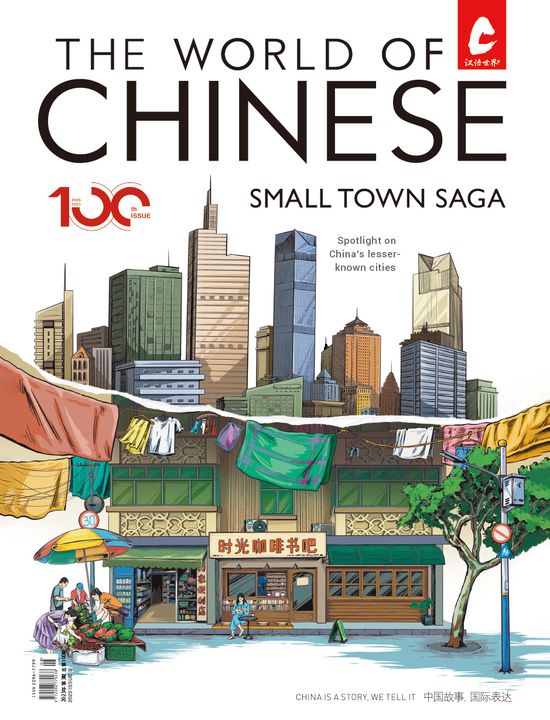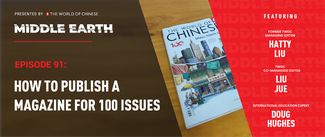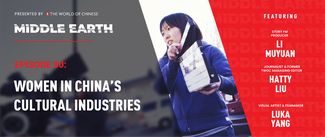Chinese idioms that teach us how to be happy
We all pursue happiness in life, but what bring each individual enjoyment and satisfaction may differ. Happiness can come from a sense of mission to break barriers and excel; or the wonder at seeing the world. The beauty of nature, and the love and affections of family also make a person happy.
Living in a world blighted by Covid-19, there’s no better time to ponder: What does it mean to be happy? In the 2020 Global Happiness survey by polling firm Ipsos, 93 percent of respondents from China said they were happy, citing safety and security as the key source. Around the world, health and relationships have gained importance as leading sources of happiness, while factors like personal financial status and amount free time have dropped on the list compared to pre-pandemic surveys.
Drawing on these sources and others, the ancient Chinese generated various idioms regarding happiness, guided by different schools of thoughts. The Chinese characters for “happiness” are 喜 (xǐ, delighted), 福 (fú, bliss, good fortune), and 乐 (lè, joy, pleasure). It is perhaps 乐 that captures the contentment of life as a whole the most.
安居乐业 ānjū-lèyè
Live in peace and work happily
This is the kind of happiness that Confucius would want for everyone: people living in a stable, harmonious community and carry out their respective duties. This idiom first appeared in official and scholar Zhong Changtong’s (仲长统) essay from the late Eastern Han dynasty (25 – 220), a turbulent era, discussing the decline and fall of great powers. According to Zhong, a good ruler should provide a stable environment for his subjects: “安居乐业,长养子孙,天下晏然,皆归心与我矣 (Citizens living in peace and working happily, fostering their offspring with safety and order under heaven; then they will all be devoted to you).”
乐此不疲 lècǐ-bùpí
Enjoy something and never tire of it
As the proverb in English goes, find something you love to do, and you’ll never work a day in your life. This idiom describes just that. The chengyu originated from the diligent founding emperor of the Eastern Han, Liu Xiu (刘秀). Liu was always busy with state affairs and often carried on discussions with his advisers deep into the night. His son worried about his health, but Liu told him that he never felt tired doing what he loves.
He loves hiking in the wild! Though he has been through some rough times, he never gets tired of it.
Tā xǐhuan yěwài túbù, suīrán chīle búshǎo kǔ, dàn réngrán lècǐ-bùpí 。
他喜欢野外徒步,虽然吃了不少苦,但仍然乐此不疲。
乐善好施 lèshàn-hàoshī
Happiness in doing good
This idiom literally translates to “enjoy doing good and love sharing”; advice we can all follow, especially during difficult times. The Book of Jin (《晋书》), a historical text written in the seventh century, recorded the story of Sun Gui (孙晷), a figure known for generosity in his village: He would always share food and blankets with the old and the poor, and never turn away those in need.
One year, a particularly bad harvest led the price of rice to rise, and some villagers went to Sun’s field to steal food. Sun spotted the culprits in the act, but didn’t reveal himself. After the villagers left, Sun cut some more rice and took it to them as gifts. Touched and ashamed, none of the villagers came to steal from Sun again.
Old Wang has been happy doing good his whole life; he has helped countless people.
Lǎo Wáng yìshēng lèshàn-hàoshī, dé dào guò tā bāngzhù de rén bújì-qíshù.
老王一生乐善好施, 得到过他帮助的人不计其数。
安贫乐道 ānpín-lèdào
Be content with poverty and strive for virtue
This phrase comes from Confucian classic The Analects (《论语》) in a discussion between Confucius and his student on virtue and wealth. However, this idiom is not meant to condemn wealth, as the much less well-known second part of the idiom states: 富而好礼 (fùérhàolǐ, be happy with ritual propriety and wealth). Ritual propriety, or li (礼), is another Confucian concept deemed critical to a well-run society. Here, Confucius suggests that whether rich or poor, virtue and rites should be important parts of one’s life.
A happy life, according to Confucius, is a fulfilled one. A person should make an active effort to benefit society and posterity, be compassionate and loving toward others, while learn extensively and cultivates one’s virtue.
乐天知命 lètiān-zhīmìng
Be content with one’s fate
If the above sounds like too much work, and you would prefer a life of less social engagements and more personal time, time to scratch Confucius in favor of Daoism. The path to real happiness, according to the Daoists, is to live with the “Way,” or “Dao (道),” a natural law of the universe that humans have no control over. This idiom comes from the I Ching (《周易》): “乐天知命,故不忧。(Be content with what fate brings, and be free of worries.)” It is often used to describe a sense of optimism in hardship.
自得其乐 zìdé-qílè
Find amusement in one’s own way
Daoists love nature and find pleasure in personal life. This idiom originally came from a cheerful depiction of a pair of white-winged finches living in the desert from Retirement to the Countryside (《辍耕录》), a history book written by Tao Zongyi (陶宗仪) in the 14th century. The idiom describes a status of peace and fulfillment in the mind.
In retirement, he practices calligraphy and drawing every day, finding amusement in his own way.
Tā tuìxiū hòu,měirì liànzì xuéhuà, dǎo yě zìdé-qílè 。
他退休后,每日练字学画,倒也自得其乐。
及时行乐 jíshí-xínglè
Enjoying the present
This final idiom is sometimes used in a negative way to refer to a short-lived pleasure enjoyed without though for long term consequences, but it is also used to remind us of the importance of living in the present.
The phrase was originally found in the history text The Incidents of the Age of Xuanhe in the Song Dynasty (《大宋宣和遗事》): “Life is fleeting, like the glint of a white horse across a chink in the door; if you don’t seize the day, you’ll be left with nothing but regret in an old age (人生如白驹过隙,倘不及时行乐,则老大徒伤悲也。).”
Cover image by VCG













